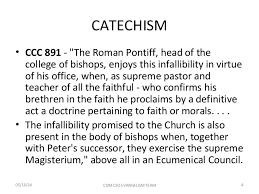
As I had discussed in a previous reflection, there are several items of the Catholic faith that are misunderstood, and criticized, by those outside of and, sometimes, inside of, the Church. The real presence, our devotion to Mary and the saints, the concept of purgatory, to name a few. Another of the big stumbling blocks that many people have is the concept of the papacy. The Bishop of Rome.
One criticism is that why should a person be in charge of the church? Christ is the true head of the church and that is where our focus should lie. However, every church, every organization has a person at its head. It is how things get organized and things get done. Bishop Barron made the analogy that having the Pope as the church’s head, as it would be for any group with a single person at the top of the hierarchy, is like having umpires in baseball. Without someone acting as arbiter, even though they they may error on occasion in their decisions, allows the game to flow and move on. Otherwise, we would have constant debates about every play in terms of what should or should not be allowed. The difference in the Catholic Church is that one person heads up all parishes in the world under the umbrella of the Roman Catholic Church. And from my perspective this gives unity and consistency to our faith and the practice of it regardless of where we are in the world.
The other argument centers around by what authority does the Pope govern. Well, we see that in today’s readings. It is by no less authority than Jesus when he declared that Peter is the rock and it is on him that Christ builds His church. And he is given the keys to the kingdom. Whatever he binds on earth is bound in heaven and what is looses on earth is loosened in heaven. Thus we see the beginning of apostolic succession that continues to this day in Pope Francis. Now this does not mean that all popes were wonderful people. For example, Alexander the VI fathered several children through his mistresses as well as attempting to have his son inherit the papacy. But as we have seen through the abuse scandal, the clergy (including popes) are people…sinful people. They are not supernatural. They are fallible.

But, wait. Aren’t popes supposed to be infallible?! That brings up the third criticism of the papacy. Infallibility. How could it be that Catholics say that popes cannot be wrong in what they say? Because this is not an accurate view of what infallibility is about. Popes are not said to be impeccable (free from error) or even holy (as we saw with Alexander VI and with Benedict IX). The concept of infallibility refers only to those times when the pope speaks ex cathedra or, “From the Throne”. This occurs in a very specific set of circumstances outlined by the first Vatican Counsel in 1870 (see the paragraph frm the catechism above). The pope needs to declare that his official statement is being made directly by him as the holder of the Chair of St. Peter and can only be stated on the subjects of Faith and Morals. How often has this occurred? Once since 1870 when in 1950 Pope Pius XII codified the concept of the Assumption of the Blessed Virgin Mary. In 1854, 15 years before Vatican I, Pope Pius the IX spoke on the concept of the Immaculate Conception. This was before Vatican I but this pronouncement fit the guidelines as outlined by Vatican I. So, two times in the history of the Church since the mid-19th Century did Popes make statements which met the criteria for infallibility through the Pope speaking ex cathedra.
The Pope can also make infallible comments when speaking on faith and morals through his position as the head of the Magisterium of the Church (the authority of the Church, as handed down from Christ, to interpret the Word of God). So, pronouncements on abortion, murder, contraception and priestly ordination have come from Popes as representing the Magisterium of the Church. The Pope can voice his views on topics such as climate change or immigration via books, letters and interviews. But these comments do not lie within the concept of papal infallibility. These are merely the Pope’s opinions on these matters.
So that’s it. Jesus began His Church with the election of Peter and it continues through the succession of the apostles and through the bishops that the apostles appointed. And it continues over time to this day. An unbroken chain of imperfect people doing extraordinary things through the strength of the Holy Spirit. Just as the early disciples put together the Scriptures through the influence of that same Holy Spirit. As we sing in that old hymn: “We are one in the spirit, we are one in the Lord”. But, in the end, what matters the most, is that “they will know we are Christians by our love”.
